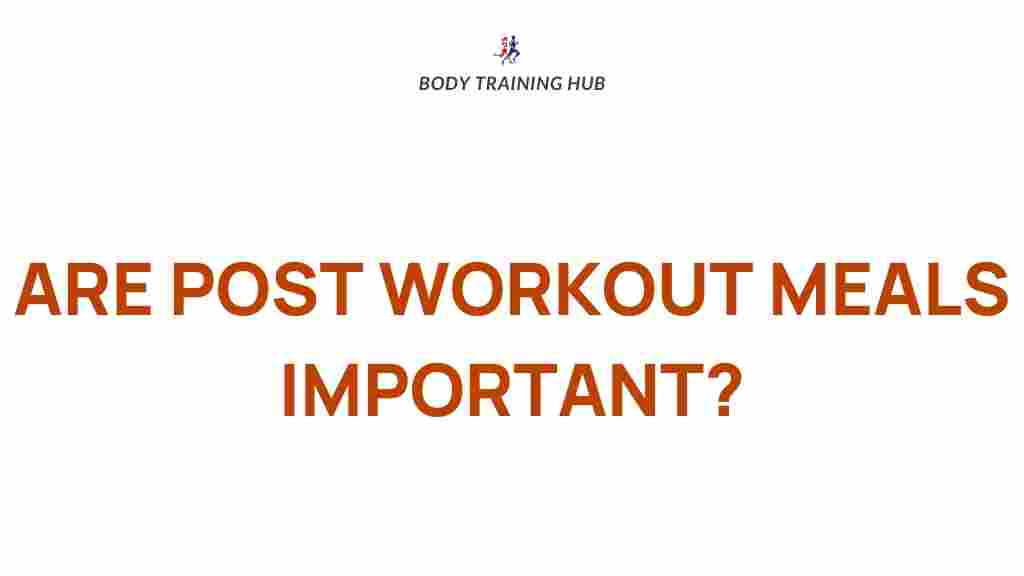Unveiling the Importance of Post-Workout Meals
After an intense workout session, your body is in a critical state where it needs proper nutrition to recover, replenish, and refuel. The significance of post-workout meals cannot be overstated, as they play a crucial role in muscle recovery, enhancing performance, and supporting overall health. In this article, we will explore the essential components of effective post-workout nutrition, how to optimize your meals for recovery, and the best foods to include in your diet.
The Science Behind Post-Workout Nutrition
During exercise, especially resistance training and high-intensity workouts, your muscles undergo stress and micro-tears. The recovery process involves repairing these tears, which is crucial for muscle growth and strength development. Adequate nutrition after your workout is essential to facilitate this process. Here’s why:
- Muscle Repair: Consuming protein after exercise provides the amino acids necessary for muscle repair and growth.
- Glycogen Replenishment: Your muscles store glycogen, which is depleted during exercise. Carbohydrates in your post-workout meals help replenish these stores.
- Hydration: Exercise leads to fluid loss through sweat. Rehydrating is crucial for overall recovery.
The Ideal Composition of Post-Workout Meals
To maximize recovery, a balanced post-workout meal should include:
- Protein: Aim for 20-30 grams of high-quality protein to aid muscle repair.
- Carbohydrates: Include complex carbohydrates to replenish glycogen stores; 1-1.5 grams of carbs per kilogram of body weight is a good guideline.
- Healthy Fats: While not as critical immediately post-workout, incorporating healthy fats can provide additional nutrients and support overall health.
- Water: Hydration is key. Drink water or electrolyte-rich beverages to replace fluids lost during exercise.
Timing Your Post-Workout Meals
Timing is crucial when it comes to recovery nutrition. Ideally, you should consume your post-workout meal within 30 minutes to two hours after exercising. This window is often referred to as the “anabolic window,” during which your body is most receptive to nutrients. Here are a few tips on timing:
- Immediately After: If you’re unable to have a full meal, consider a protein shake or a snack containing both protein and carbs.
- Meal Planning: If you work out regularly, consider meal prepping your post-workout meals to ensure you always have nutritious options on hand.
Best Foods for Post-Workout Recovery
Choosing the right foods can make a significant difference in your recovery. Here are some excellent options to consider for your post-workout meals:
- Grilled Chicken with Quinoa: A lean protein source paired with a complex carbohydrate.
- Greek Yogurt with Berries: Provides protein and antioxidants to support recovery.
- Protein Smoothie: Blend protein powder with spinach, banana, and almond milk for a nutrient-rich shake.
- Eggs and Whole Grain Toast: Eggs are a great source of protein, and whole grain toast provides necessary carbs.
- Hummus and Vegetables: A good snack option that offers protein, fiber, and healthy fats.
How to Create a Post-Workout Meal Plan
Creating a post-workout meal plan is a great way to ensure you are meeting your nutritional needs. Here’s a simple step-by-step guide:
- Assess Your Needs: Determine your daily caloric needs based on your activity level and fitness goals.
- Choose Your Protein: Select a protein source (chicken, fish, beans, etc.) that you enjoy and can easily prepare.
- Incorporate Carbs: Choose a carbohydrate source (sweet potatoes, brown rice, oats) that complements your protein.
- Add Vegetables: Include a variety of colorful vegetables to boost nutrient intake.
- Stay Hydrated: Always include a hydrating element, whether it’s water, coconut water, or an electrolyte drink.
Common Mistakes to Avoid
While focusing on post-workout meals, it is easy to make some common mistakes. Here’s what to avoid:
- Skipping Meals: Not eating after a workout can hinder recovery and muscle growth.
- Overlooking Carbs: Some may focus solely on protein and neglect the importance of carbohydrates for glycogen replenishment.
- Waiting Too Long: Delaying your post-workout meal can reduce the effectiveness of recovery.
Post-Workout Snacks for On-the-Go
If you’re busy and can’t prepare a full meal immediately after your workout, consider these quick and easy snacks:
- Protein Bars: Look for bars with natural ingredients and a good balance of protein and carbs.
- Nut Butter with Fruit: Apples or bananas with almond or peanut butter make a tasty and nutritious option.
- Trail Mix: A mix of nuts, seeds, and dried fruit can provide quick energy and nutrients.
Hydration Strategies Post-Workout
Hydration is a critical aspect of post-workout recovery. Here are some strategies to ensure you stay hydrated:
- Drink Water: Aim for at least 16-24 ounces of water after exercising.
- Electrolyte Drinks: If you’ve had an intense workout or sweat excessively, consider beverages that replenish electrolytes.
- Monitor Urine Color: A light yellow color typically indicates adequate hydration.
Listen to Your Body
Everyone’s nutritional needs post-workout may vary based on factors such as age, gender, body composition, and workout intensity. Pay attention to how your body responds to different foods and adjust your post-workout meals accordingly. Keeping a food diary can be an effective way to track what works best for you.
Additional Resources
For more information on nutrition and exercise, consider visiting resources like the Academy of Nutrition and Dietetics for expert advice and tips.
Conclusion
In conclusion, post-workout meals are a vital component of any fitness regimen. They help refuel your body, promote effective recovery, and support overall performance. By focusing on the right balance of nutrition, you can enhance your exercise results and pave the way for better health. Remember to prioritize your post-workout nutrition, listen to your body, and adjust your meals to meet your specific needs. With the right approach, you’ll set yourself up for success in your fitness journey.
This article is in the category Nutrition Fundamentals and created by BodyTraining Team
